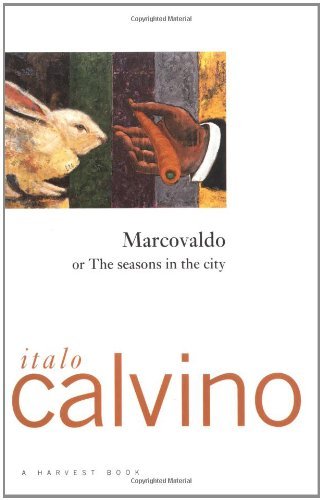What do you think?
Rate this book


128 pages, Paperback
First published January 1, 1963
This Marcovaldo possessed an eye ill-suited to city-life: billboards, traffic-lights, shop-windows, neon signs, posters, no matter how carefully devised to catch the attention, never arrested his gaze, which might have been running over the desert sands. Instead he would never miss a leaf yellowing on a branch, a feather trapped by a roof-tile; there was no horsefly on a horse's back, no worm-hole in a plank, or fig-peel squashed on the sidewalk that Marcovaldo didn't remark and ponder over, discovering the changes of the season, the yearnings of his heart, and the woes of his existence.
Marcovaldo went back to look at the moon, then he went to look at a traffic light, a bit farther on. The light flashed yellow, yellow, yellow, constantly blinking on and off. Marcovaldo compared the moon with the traffic-light. The moon with her mysterious pallor, also yellow, but also green, in its depths, and even blue; the traffic-light with its common little yellow. And the moon, all calm, casting her light without haste, streaked now and then by fine wisps of clouds, which she majestically allowed to fall around her shoulders; and the traffic-light meanwhile, always there, on and off, on and off, throbbing with a false vitality, but actually weary and enslaved.The city has a coldly modern art to it, a "false vitality" - it is art, it can only imitate life. To Marcovaldo there is not value to this false beauty, it is unnatural and mechanical. But Calvino's descriptions of it show that though it does not fit the ideal, there is some art to be had in the man made world. Man is like the traffic light in the city, morning:on, evening:off, in to work then back to home, enslaved to routine, chained to the consumerism which drives him. The city is not an ugly place, but rather is the prison of a stifling life. Marcovaldo, for all his dislike of the city, is not an unhappy man, though he is plagued by modern troubles, and though he is constantly made the fool of his own gambits, he is a many happy in his childhood-in-middle-age. He has not lost the innocence of youth, not lost that vitality or winsome hope for adventure, invention, imagination. Though Calvino supports a sojourn in nature, he does not completely condemn the world which is reality, the world with winking traffic lights. More important that escaping the city is escaping routine, being spontaneous, being enthusiastic, loving life for what it has to offer and not grudging it for what it lacks.

Tai buvo vienas tų žalių lapuočių, laikomų viduje, tiesiu ir laibu kamienu, nuo kurio į visas puses ant išstypusių kotelių žėlė blizgūs dideli lapai; trumpai tariant, vienas tų augalą primenančių augalų su lapo formos lapais, kurie anaiptol neatrodo tikri. (p. 89)
Kiekvieną mielą dieną tviskančios parduotuvių vitrinos vos spėdavo veržliai pražysti: kadaruodavo rausvos dešros, porceliano lėkščių bokštai siekdavo lubas, audinių ritiniai išskleisdavo įmantrias drapiruotes it povai uodegas ir štai - vartotojų minia jau veržėsi vidun naikinti, kapoti, maigyti ir griebti visko, kas po ranka. Visais šaligatviais ir portikais nusidriekdavo ilgiausios eilės, įsiverždavo pro stiklines parduotuvių duris ir apraizgydavo prekystalius, stumdydavo alkūnėmis it stūmokliais kaimynams į šonkaulius, vartokite! Žmonės čiupinėjo prekes, dėdavo atgal, vėl paimdavo, plėšdavo viens kitam iš rankų, vartokite! Šokdino perbalusias pardavėjas, versdavo išskleisti ant prekystalių baltinukus ir patalynę, vartokite! Spalvoti siūlų kamuoliukai sukdavosi it vilkeliai, gėlėti popieriaus lakštai gagėdami plasnojo sparnais ir vyniojo pirkinius į paketėlius, paketėlius į paketukus, paketukus į paketus, kiekvieną perrišant dailiu kaspinėliu, ir - pirmyn! Paketai, paketukai ir paketėliai, krepšiai ir krepšiukai verpetavo prie kasų lyg didžiulėje eismo spūstyje, rankoms rankinukuose įnirtingai ieškant piniginių ir pirštams piniginėse įnirtingai ieškant smulkių, kol tankioje svetimų kojų ir paltų skvernų girioje už rankų nebelaikomi vaikai pasiklysdavo ir paleisdavo dūdas. (p. 96-97)
Pramonės ir prekybos pasaulius nėra kito tokio palaimingo ir puikaus laikotarpio metuose kaip Kalėdos ir prieškalėdinės savaitės. Gatvėmis vilnija virpantys dūdmaišių garsai; anoniminių akcininkų bendrovės, dar vakar panirusios į šaltus faktūrų ir dividendų skaičiavimus, atlapoja širdį jausmams ir šypsenoms. Pagrindinis direktorių tarybų rūpestis dabar - suteikti džiaugsmo artimui pasiunčiant dovanų ir sveikinimų atvirukų tiek dukterinėms įmonėms, tiek pavieniams klientams. Kiekviena įmonė jaučia pareigą įsigyti didžiulį prekių asortimentą iš kitos įmonės, kad vėliau padovanotų jį dar kitoms įmonėms, kurios savo ruožtu perka iš kitos įmonės dovanų asortimentus dar kitoms įmonėms. (p. 126)